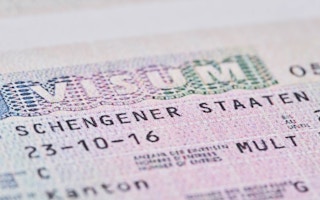When Nigerian lawyer Obioma Adesewa Okonkwo was booked to speak at the RightsCon conference in Costa Rica, she made sure to submit her visa application several months in advance.
As the date approached with no sign of her travel documents being granted, she felt she had no choice but to cancel her trip and contact organisers at advocacy group Access Now to arrange to join online instead.
More than 300 participants were unable to attend the digital rights conference in person due to visa issues, Access Now said in a statement.
Kenya-based Nanjala Nyabola, a board member at Access Now, said many Black and brown participants had been picked out and detained by Costa Rican border agents for periods of up to three hours. Some were later deported, she wrote on Twitter.
Anger over their treatment has reignited debate about unequal visa and border regimes that limit Global South nationals’ participation in international conferences tackling issues from climate change to economic systems and conflicts.
“If you have a summit that is global then you have to consider that there are people coming from countries who are regularly denied visas,” said Okonkwo, a legal officer at Media Rights Agenda, which defends freedom of expression in Nigeria.
“I really wanted to learn from digital rights advocates from other continents … I was shut out from participating in those kinds of discussions.”
“
We have a responsibility to ensure that participants are seen and that their voices matter in these spaces. It’s our responsibility to anticipate and help mitigate the barriers participants will face.
Nikki Gladstone, director, RightsCon
She said her visa application was eventually rejected.
Access Now, a global organisation headquartered in New York, said authorities in Costa Rica had agreed to offer visas on arrival in the country for conference attendees, but border authorities did not uphold the arrangement.
It apologised to all those impacted, and pledged to learn and make changes as a result.
“We have a responsibility to ensure that participants are seen and that their voices matter in these spaces,” said Nikki Gladstone, RightsCon Director, in emailed comments to Context.
“It’s our responsibility to anticipate and help mitigate the barriers participants will face.”
She said the event is held in different countries each year in an effort to be more accessible, and they chose Costa Rica because they had never had the summit in Central America before.
The Costa Rican government did not immediately respond to requests for comment.
‘Visa justice’ fights
Critics say visa rules that are stricter for citizens of poorer nations are a significant factor limiting participation of people from developing countries in major conferences.
Ugandan climate activist Hamira Kobusingye said she often needs letters of recommendation to apply for visas to attend summits - a step not required of most Global North travellers.
Despite her efforts, she said she was denied visas to attend the Bonn Climate Change Conference in Germany in June and the UN 2023 Water Conference in New York.
“My colleagues all over the continent were denied visas,” she said, adding that they were being distracted from their campaigning work by “visa justice” battles.
Kobusingye said she was told her applications did not meet the criteria for a visa. The German foreign office and US border control, and both countries’ embassies in Uganda, did not immediately respond to requests for comment.
Kobusingye said restricting access of grassroots campaigners meant major decisions could be made without much input from the people who are most affected.
Africa has been hit disproportionately hard by the fallout from climate change, while international efforts to secure funds for adaptation and recovery for heavily affected developing nations have fallen short.
“It seems like the Global North is trying to find solutions for the climate crisis without the people who are most affected,” said Kobusingye.
“They can push through what they want because they have very little resistance.”
In 2021, after Black Lives Matter protests in many countries prompted widespread discussions over inclusion, the COP26 UN climate summit was criticised for a lack of diversity, with the hashtag #cop26sowhite trending on Twitter.
The UN climate change body UNFCCC, which organises the Bonn and COP summits, did not immediately respond to requests for comment.
Ahmed Ogwell Ouma, acting director of the Africa Centers for Disease Control and Prevention, said he struggled to enter Germany for a world health summit last year due to mistreatment by border staff who suspected he wanted to stay on illegally.
“My attendance of the @WorldHealthSmt is now in doubt. I’m happier & safer back home in Africa. They invite you then mistreat you,” he wrote on Twitter.
Ouma was ultimately granted entry, and the German health minister later said in a tweet that officials were looking into what had gone wrong at the airport.
Not in the room
Campaigners and policy analysts said summit organisers should be mindful of visa policies when selecting host countries.
Okonkwo said organisers should have conferences in visa-friendly countries that are not discriminatory towards people from poorer nations.
In an open letter with charities and civil society groups, Access Now urged governments to adopt “flexible and generous” visa approval policies for human rights defenders, activists and journalists.
Enabling Global South participants to be physically present at high-level talks was critical to ensure decisions are as representative as possible, said Kathryn Nwajiaku-Dahou, director of the Politics and Governance programme at ODI, a global think-tank based in Britain.
“It’s where the real political work takes place. It’s what happens in the corridors, it’s the informal mingling. That’s where powerful relationships get struck,” she said.
“So, if you’re not in the room, you’re not in the room.”
This story was published with permission from Thomson Reuters Foundation, the charitable arm of Thomson Reuters, that covers humanitarian news, climate change, resilience, women’s rights, trafficking and property rights. Visit https://www.context.news/.

















